Student Success Center
MS in Health Care Informatics (Online)
Welcome!
As an online student, most of your interactions with the university will be done through various websites. For example:
- You’ll use your USD Email Address for all university-related communications.
- You’ll use Canvas for all of your coursework and assignments. See Canvas Tips and Tricks page.
- You’ll use your MySanDiego portal for tuition payments and to access most campus resources.
- You’ll use this site, your Student Success Center, to get specific information about textbook information, deadlines, and more!
- If you identify as alumni, visit our Alumni page to remain engaged.


Your academic COORDINATOR
Tony Rosales, RN, DNP, CNS, FNP-BC
Your ACADEMIC DIRECTOR
Dorothy O'Hagan, PhD(c), RHIA, CCS

COMPLETE YOUR MANDATORY NEW STUDENT CHECKLIST
Our number one priority is you! Our team has prepared a checklist of items that will set you up for success and clarify all action items as a new student. After you are enrolled for your first term and receive a confirmation email from a member of our team, please complete and review all of the following before classes start.
1. View Your Mandatory New Student Welcome Webinar
This webinar will go over a comprehensive look at your program and what to expect as an online learner including resources and tips for success. Each webinar should last around 30-40 minutes. Once you have been registered for classes and receive a confirmation email from our team, you will be emailed the link to schedule your welcome webinar to your @sandiego.edu email address.
2. Schedule Your New Student Check-in Call
In this call, you’ll “meet” a member of your Student Success Team for your program. This will be a chance for us to answer any additional questions you have before you start your first term. Please be sure to have any Canvas-related, program-related, or finance-related questions prepared. After attending the Welcome Webinar, you will be prompted to schedule your call using a scheduling link.
3. Schedule a Welcome Call with your Academic Coordinator
This phone call/zoom meeting is a chance to meet your Academic Coordinator, Dr. Tony Rosales and discuss any curriculum, career, and academic track-related questions. This call will occur after your phone call with the Student Success Team.
4. Complete Your Canvas Orientation Course - Due August 29, 2025
Once you have been registered in your classes, you will be able to access your New Student Orientation Course (HCIN 501) on Canvas within 4 hours. When accessing Canvas, please make sure to use Firefox or Chrome as your browser.
The New Student Orientation course is designed to help you navigate your way around your course's layout prior to beginning your first class. You will learn where to find the syllabus, course schedule, assignments, and discussion boards.
Your Orientation is mandatory, and must be completed before the first day of class—so we encourage you to get started! Please plan to spend about 16-20 hours completing the Orientation course. You can move through the Orientation at your own pace, so schedule your time accordingly.
Looking for assistance?
5. Finalize Your Tuition Payment Plan
We recommend that students start this planning early as some funding sources can take some time to process. Tuition payments should be completed in full by the first day of the semester. Visit the "Tuition and Payment Methods" section for more information.
6. Review your Student Handbook
Please make sure to review your student handbook prior to the first day of class, and reference it as needed throughout your program. The handbook is where you can find information on academic expectations, drop and refund policy, technology requirements, curriculum, frequently asked questions, and more.
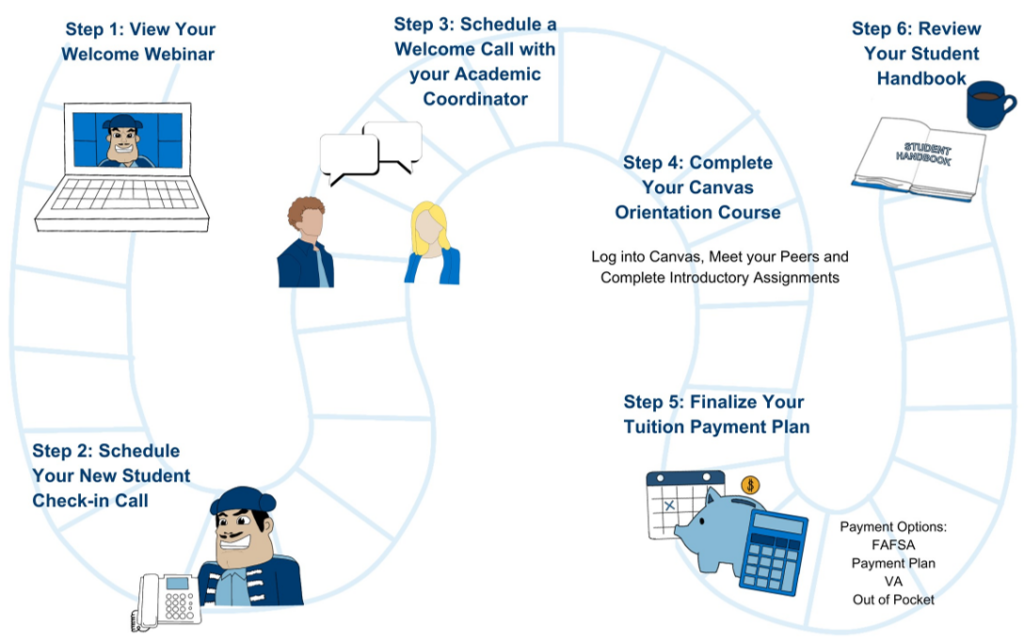
IMPORTANT DATES
Below is a list of significant dates regarding the registration process, payment deadlines, and other important academic and program deadlines.
Fall 2025 Dates and Deadlines
| Important Dates | Date |
|---|---|
| Registration Opens | June 30, 2025 |
| Application Deadline | August 1, 2025 |
| Registration Deadline | August 15, 2025 |
| Orientation Course Due Date | August 29, 2025 |
| Last Day to Drop with 100% Tuition Refund* | September 1, 2025 |
| Payment Due Date | September 2, 2025 |
| Semester Begins | September 2, 2025 |
| First Course Start Date | September 2, 2025 |
| Last Day to Drop with 95% Tuition Refund/ Drop Deadline* | September 5, 2025 |
| Last Day to Withdraw from Course A | September 29, 2025 |
| First Course End Date | October 20, 2025 |
| Second Course Start Date | October 21, 2025 |
| First Course Final Grade Submission Due Date | November 3, 2025 |
| Last Day to Withdraw from Course B | November 17, 2025 |
| Second Course End Date | December 8, 2025 |
| Semester Ends | December 8, 2025 |
| Second Course Final Grade Submission Due Date | December 22, 2025 |
Spring 2026 Dates and Deadlines
| Important Dates | Date |
|---|---|
| Registration Opens | November 3, 2025 |
| Application Deadline | December 1, 2025 |
| Registration Deadline | December 15, 2025 |
| Orientation Course Due Date | January 2, 2026 |
| Last Day to Drop with 100% Tuition Refund* | January 5, 2026 |
| Payment Due Date | January 6, 2026 |
| First Course Start Date | January 6, 2026 |
| Last Day to Drop with 95% Tuition Refund/ Drop Deadline* | January 9, 2026 |
| Last Day to Withdraw from Course A | February 2, 2026 |
| First Course End Date | February 23, 2026 |
| Second Course Start Date | February 24, 2026 |
| First Course Final Grade Submission Due Date | March 9, 2026 |
| Last Day to Withdraw from Course B | March 23, 2026 |
| Second Course End Date | April 13, 2026 |
| Semester Ends | April 13, 2026 |
| Second Course Final Grade Submission Due Date | April 27, 2026 |
Summer 2025 Dates and Deadlines
| Important Dates | Date |
|---|---|
| Registration Opens | March 3, 2025 |
| Application Deadline | April 4, 2025 |
| Registration Deadline | April 18, 2025 |
| Orientation Course Due Date | May 2, 2025 |
| Last Day to Drop with 100% Tuition Refund* | May 5, 2025 |
| Payment Due Date | May 6, 2025 |
| Semester Begins | May 6, 2025 |
| First Course Start Date | May 6, 2025 |
| Last Day to Drop with 95% Tuition Refund/ Drop Deadline* | May 9, 2025 |
| Last Day to Withdraw from Course A | June 2, 2025 |
| First Course End Date | June 23, 2025 |
| Second Course Start Date | June 24, 2025 |
| First Course Final Grade Submission Due Date | July 7, 2025 |
| Last Day to Withdraw from Course B | July 21, 2025 |
| Second Course Final Grade Submission Due Date | August 25, 2025 |
| Semester Ends | August 11, 2025 |
* During the first semester of enrollment, any tuition refund amounts will not include the non-refundable enrollment deposit amount (5% of tuition).
Graduate Student Success Program
Dates: July 28-30th, 2025
The Graduate Student Success Program is an optional opportunity for students to unpack the hidden curriculum of graduate school, connect with other graduate students across the university, and feel empowered to step into the new identity of being a graduate student and scholar. Through workshops and presentations, our virtual program will address questions such as:
- How do I make the most of my experience as a graduate student?
- What if I feel like I don’t belong here?
- How do I interact with faculty as a graduate student?
- How do I tend to my financial wellness while in graduate school?
- What are some strategies to access support?
Download a pdf of your academic calendar
Upcoming Events
Don't miss out on connecting with your University of San Diego global community through a variety of events - featuring academic workshops, cultural celebrations, networking events, and more. There’s something for everyone!
Class Registration Directions
You have most likely already filled out an Enrollment Agreement, which enables our team to register you for classes each term. No further action is required on your part.
If you are not able to register for both of your courses in a given term, please contact your program coordinator immediately. This often happens for students who need to take a leave of absence.
Textbook information
Students are required to have their textbooks on hand by the first day of class. Unless otherwise specified, students may select any vendor they prefer (such as Amazon.com, Half.com, Alibris.com, etc.) to purchase their course materials. In the event a specific vendor is required, it will be specified in the course materials list. The best way to ensure that you have the correct book is to search by the ISBN number(s) listed on the book list.
Physical copies of books are not on hand at the USD Torero Store. The USD Torero online store does offer price comparisons for different online vendors for some books.
Although all textbooks for all courses are listed, students only need to purchase the items for the classes they are taking for the semester.
Digital Inclusive Access (IA) - Integrated VitalSource Textbooks
If your course is indicated to have a "Digital Inclusive Access" textbook, you do have the option to use the integrated Vitalsource e-textbook without needing to purchase a textbook through an outside vendor. For more information, view the "Digital Inclusive Access" FAQs document.
- Students are able to access the e-textbook directly in the course without worrying about purchasing the wrong version or textbook!
- If your course is indicated as using “Digital Inclusive Access” on the textbook list, please note that you must opt-out within the first 7 days of each course to avoid being charged for the guaranteed-lowest price textbook.
- If you do intend to use “Digital Inclusive Access”, no further action is required after you create a Vitalsource account.
- No refunds can be issued once the textbook charge has been assessed.
By using Vitalsource e-Textbooks, students are able to use study tools in Bookshelf such as highlighting, printing limited pages/chapters, sharing notes, and using the Bookshelf CoachMe tool to test their learning while they read.
PAYing for your program
Tuition at USD is billed per semester, not per course. Payment (or enrollment in an official USD payment plan) is always due by the first day of the semester. Students may not carry balances from one semester to the next.
Accounts with outstanding balances after the official payment due date may be subject to course cancellations/removal or a student account hold during the semester; related holds can prevent upcoming registration, graduation, or obtaining transcripts.
Remember: tuition is always due by the first day of each semester.
Tuition amounts shown on this website, or in other university publications or web pages, represent tuition and fees as currently approved. However, the University of San Diego reserves the right to increase or modify tuition and fees without prior notice and to make such modifications applicable to students enrolled at USD at that time as well as to incoming students. In addition, all tuition amounts and fees are subject to change at any time for correction of errors.
Program Tuition
Once you have been registered for your courses, your student account will reflect the appropriate tuition costs according to your program. Payments not received by the deadlines are subject to late fees. Your program’s tuition is the following:
- Per Unit (classes are typically 3-units) = $995
- Per Semester (assuming 6-units per semester) = $5,970
- Total Program Cost (including 5 semesters) = $29,850
Students who need to re-take or withdraw from a course may need to pay additional fees according to the Refund/Drop Deadline policies listed in your Student Handbook.
If you have any questions about your Student Account, please reach out to the Torero Hub by submitting their inquiry form or phone at 619-260-2700. All costs and fees are subject to change and are based on the academic year of enrollment.
ENROLLMENT DEPOSIT
Please note that students in USD’s MS in Health Care Informatics program are required to submit a one-time 5% non-refundable deposit. The payment will automatically be applied to your first-semester tuition.
Refund Policy
Students will be registered for their prescribed courses each semester. All courses must be dropped prior to the first day of the semester to receive a 100% tuition refund* and within the first three days of the start date of the semester to receive a 95% tuition refund*. No refund (reversal of tuition) will be provided after the third day of the semester for any class. *During the first semester of enrollment, any tuition refund amounts will not include the non-refundable enrollment deposit amount (5% of tuition).
DEGREE PROGRESS and COMMENCEMENT
DegreeWorks
You can track your progress toward earning your degree using the Degree Works feature in your MySanDiego student portal. Degree Works shows you which courses you have completed, grades, cumulative GPA, any outstanding graduation requirements, and more!
To access Degree Works:
- Log in to your MySanDiego student portal.
- Under the “Torero Hub” tab, click on “My Academics.”
- On the right-hand side under “My Academic Resources”, click on “Degree Works.”
Petition to Graduate
Submitting your petition to graduate is a requirement for every student. About a semester before your final term, you will be reminded by your Program Coordinator to submit your petition to graduate. Once completed, your Academic Coordinator will review your academic record and contact you if there are any outstanding requirements or issues.
Commencement timing
If you are planning on participating in the commencement ceremony (which means walking in your cap and gown here on campus), you will be invited to come to the University of San Diego to participate in the ceremony. Commencement details and information will be sent from your Student Success Team around the month of February.
- There is only one commencement ceremony each academic year in May.
- Fall and Spring graduates will be invited to the commencement ceremony the May after they graduate.
- Summer graduates will be invited to the commencement ceremony the May before they graduate.
Diploma Details
The Registrar will process their final audit of the degrees 6-8 weeks after grades are posted for your final semester. Once the degree is conferred in the system, the Registrar will order your diploma from the vendor and the vendor will send it to you directly to the address that was listed on your petition to graduate.
If your mailing address changes after you submit your Petition to Graduate, please notify the Graduate Records office at (619) 260-2217 or [email protected].
You will receive a digital diploma to your @sandiego.edu email address once your degree has been officially conferred.
You will also receive a physical diploma. Mailing time is an additional 6-8 weeks from the date of order, and you will likely receive your diploma in the mail in 3-4 months after you have completed your degree requirements.
Course Details
program requirements
Based on your start term and catalog year, there are two curriculums in the MS-HCI program. Completing all of the courses in your prescribed curriculum is required for program graduation.
View your Program's Course Carousel (Students that Started Spring 2024 - Present)
The curriculum is a total of 30 units comprised of ten 3-unit courses.
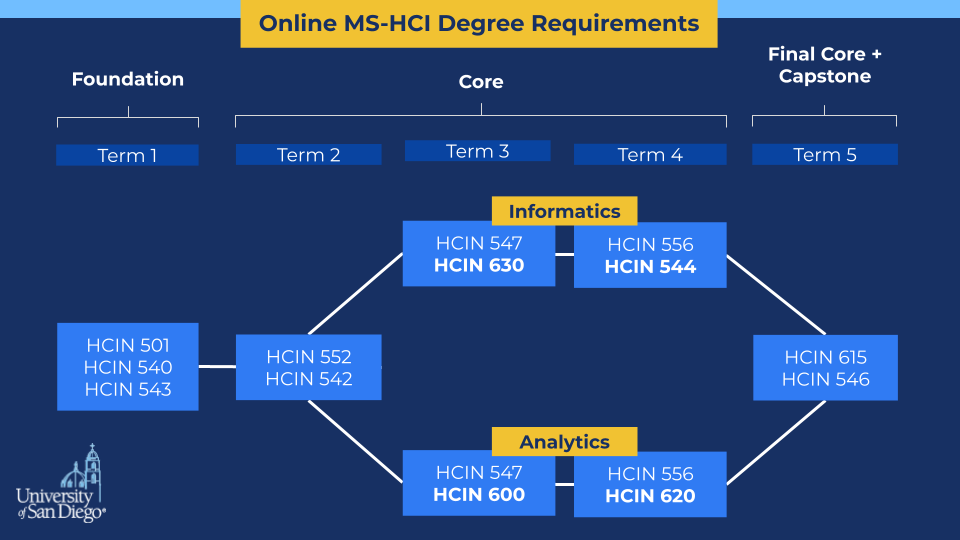
View your Program's Course Carousel (Students that Started Fall 2022 - Fall 2023)
The curriculum is a total of 37 units comprised of twelve 3-unit courses, three 0-unit capstone preparatory courses, and one 1-unit integrative capstone. Use the navigation arrows or dots below to view the three tracks in your program.
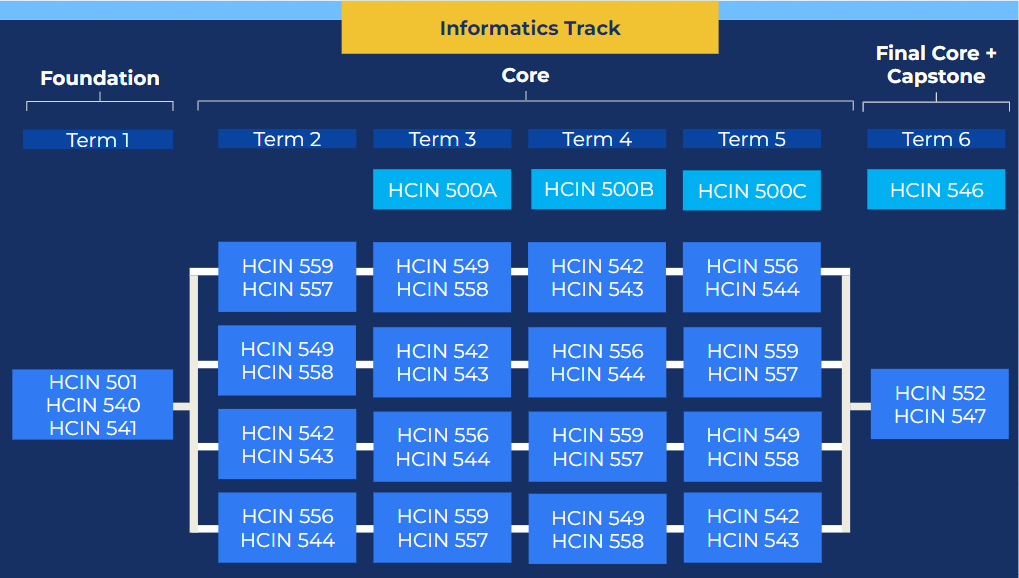
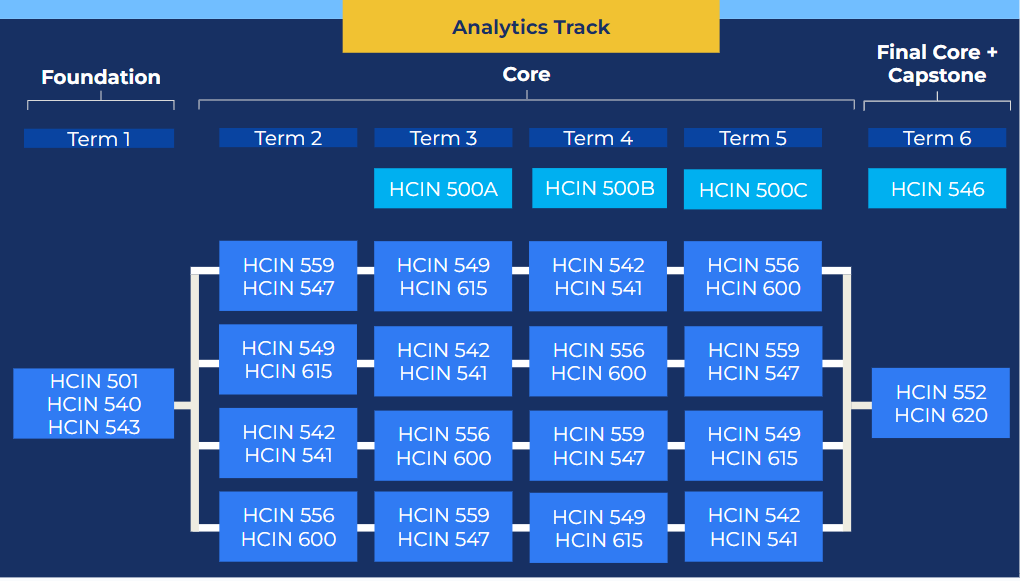
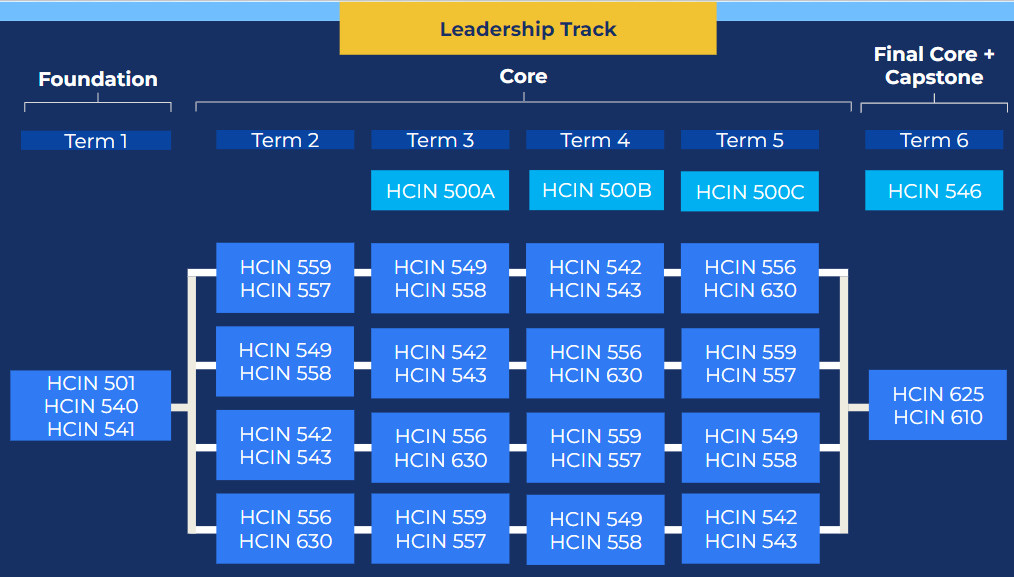
Course Titles and Descriptions
Introduction to Health Care Information Management (HCIN 540)
This course provides foundational knowledge and skills in health information management, informatics, and U.S. healthcare delivery, focusing on computer hardware, network architecture, electronic health records (EHRs), and healthcare software applications. It covers regulatory compliance, patient privacy, information security, and healthcare reimbursement while exploring current healthcare delivery trends, EHRs, interoperability, precision medicine, and healthcare database management and data analysis skills.
Systems Analysis and Design for Health Care Informatics (HCIN 542)
This foundational course in the MS Degree in Health Care Informatics equips students with the essential knowledge and skills required for the planning, analysis, design, and implementation of computer-based information and technology systems within healthcare settings. Topics covered encompass the complete spectrum of system development, project management, and technology integration and include: the systems development life cycle, project management skills, requirement analysis and specification, feasibility and cost-benefit analysis, workflow analysis, process improvement/optimization leveraging techniques such as Lean Six Sigma, and Agile, logical and physical design, prototyping, system validation, change and communication management, deployment, human factors, and post-implementation review. Through a structured design, students gain a deep understanding of these critical elements, preparing them to navigate the complex landscape of health informatics and contribute effectively to healthcare technology advancements.
Database Design and Knowledge Management (HCIN 543)
This course offers opportunities for students to acquire advanced database skills. Applied skills, emphasizing database design, data structuring, modeling and the development of database management systems are examined. Fundamental competencies in knowledge management, change management, and system engineering as they pertain to the healthcare environment and related fields are explored. Students will design and manipulate databases using software applications, such as Structured Query Language (SQL), to resolve selected operational problems.
Advanced Health Care Information Management (HCIN 544)
This course explores advanced healthcare information management topics, focusing on cybersecurity, interoperability, emerging trends in technology, and health system leadership. Ethical considerations and professional practice are central to the discussions. Privacy, security risk assessments, and comprehensive security plans for health systems are examined. Students will apply reflective practice to extract meaningful insights from leadership activities.
MS Health Care Informatics Capstone (HCIN 546)
This capstone course marks the conclusion of the online MS Health Care Informatics, designed for an in-depth exploration of the field of health informatics with a focus on its application across various health science areas. Students will explore how information technology and healthcare intersect to address modern challenges in health sciences, emphasizing the evaluation of health information technology systems in meeting current healthcare needs. The course culminates with each student completing a project that will be presented for professional and peer evaluation. Additionally, the course includes the development of a reflective ePortfolio and an exploration of current issues in Health Informatics within the context of a rapidly evolving healthcare delivery system.
Health Care Analytics (HCIN 547)
The course emphasizes the practical application of data analytics in addressing specific clinical queries, crafting clinical decision support rules, and employing precision medicine concepts. Students will develop the practical skills necessary to use various types of clinical data in addressing clinical inquiries using an evidenced-based approach. A range of clinical data sets will be examined including those at the population level. Through clinical case studies students will develop their data analytics expertise.
Clinical Documentation: Electronic Medical Record Systems (HCIN 552)
Students will engage in a comprehensive exploration of clinical documentation systems. This course offers a blend of theoretical knowledge and practical application, with a strong focus on experiential learning using an academic electronic health record system. Students will trace the historical trajectory of clinical documentation systems, gaining insight into their development and evolution over time. Students will examine the intricate hardware and software requirements essential for Electronic Health Records (EHRs). A problem-based learning approach is employed to cultivate students' proficiency in developing clinical rules and alert systems for clinical information systems. These skills will be applied for purposes such as quality assessment, risk analysis, billing processes, bioinformatics, genomics, and research applications. Emphasis is placed on understanding the regulatory landscape surrounding EHRs, including compliance with the Health Insurance Portability and Accountability Act (HIPAA), the Genetic Information Nondiscrimination Act (GINA), requirements from the Centers for Medicare and Medicaid Services (CMS), and information security regulations.
Health Care Leadership, Values, and Social Justice (HCIN 556)
This course explores the role of leadership in driving innovation and change in healthcare organizations. Students will examine leadership theories, ethics, values, and social justice principles and their relevance in the healthcare setting. Project implementation strategies will be explored. An experiential learning approach is used, enabling participants to gain practical experience, develop transferable and marketable skills, and engage in reflective practices to foster leadership growth. The knowledge and skills acquired through this experience are designed to enhance competencies in leading within diverse healthcare settings.
Population Health Analytics (HCIN 600)
This course focuses on the Institute for Healthcare Improvement’s Triple Aim and how data analytics can be used to identify and address health disparities. Methods for measuring and analyzing population disease burden are explored. Students will apply various data sets, including disease registries, electronic health records, claims data, and socio-economic data, to measure, trend, and analyze the impact of disease on various populations.
Research Fundamentals and Biostatistics (HCIN 615)
This course focuses on advanced methods and tools aimed at managing a diverse array of healthcare challenges. Students will develop skills to evaluate data for the purpose of formulating, resolving, and empirically testing data-driven hypotheses. It examines the application of quantitative and qualitative data, and biostatistics, to critically assess healthcare programs and research endeavors. Pivotal domains of data stewardship and data governance are examined. Information security, privacy, and confidentiality are discussed as related to the roles of an informaticist and data analyst. Complementing these core topics, the curriculum also explores emerging trends in healthcare, data science, genomics, and bioinformatics.
Machine Learning Applications for Health Care (HCIN 620)
This course will explore the application of machine learning (ML) to the health care setting. ML is a field of computer science that trains computers to recognize patterns in complex data sets and formulate predictions based upon designed algorithms. ML can be used to predict hospital readmission, identify patients who may develop hospital-acquired infections, and support diagnostic reasoning for clinicians. The course will explore various ML methods to design algorithms for solving common clinical problems. In addition, students will gain a basic understanding of how ML methods can learn from data to find underlying patterns useful for prediction, classification, clustering, and exploratory data analysis.
*Note: all electronic portfolios have password protection and other security options to keep information secure.
Digital Health Care Marketing (HCIN 625)
This course will explore marketing principles and methods utilized in the health care industry from the perspective of a health care leader. Students will learn how to assess market needs for health care organizations and service lines. The course will include case studies to understand ethical, regulatory, and liability issues in health care marketing. Additional course topics include web-based advertising, management of marketing staff, and website design.
Health Care Law and Risk Management (HCIN 630)
This course explores the legal principles and strategies for minimizing risk and liability within healthcare systems. Through the examination of case studies, students will review legal and ethical dilemmas arising in healthcare. The laws and regulations governing information management, patient rights, patient privacy (Health Insurance Portability and Accountability Act HIPAA), and quality management in healthcare are explored. Students will use various quality management tools, such as Root Cause Analysis (RCA) and a Failure Mode Effect Analysis (FMEA), to address liability issues within the healthcare setting.
Student Resources
This list is helpful resources that will set you up for success. Haven’t written in APA formatting since your undergraduate program? We’ve got you covered! Want to know what type of computer you will need? No problem. We have listed helpful resources below.
Academic Requirements and Resources
Technical Requirements
You must own or have unrestricted access to a computer for this program. A fast Internet connection is also mandatory. Computers should be Windows-based (Mac based computers are not compatible with the required software) and have a minimum of 512 GB SSD storage, 16-32 GB memory (RAM), and a processor of Intel Core i5 13th Gen or above.
Courses will utilize a variety of technologies and multimedia. To complete course activities and to access course content, please verify that you have the following technologies and plug-ins available:
- Browser Plug-ins – Windows Media Player, QuickTime, Shockwave, Adobe Reader, and Java.
- Mozilla Firefox or Google Chrome are the recommended browsers.
- Microsoft Office is required. If you are using Office 2003 or earlier, download and install the Microsoft Office Compatibility pack. Students may log in using USDOne credentials and install applications directly on the Microsoft Portal, too.
- Speakers or headset – to listen to multimedia.
- Webcam – for recording video.
- Email – To contact your faculty.
- High-speed internet connection strongly encouraged (100mbps or better)
Graduate Writing Expectations and Tips
All writing assignments must be formatted according to APA standards. Discussion posts must contain the appropriate APA citations. If you want additional writing support, we recommend Purdue Online Writing Lab (OWL@Purdue). In addition to general writing support, the website includes a special section dedicated to APA formatting guidelines.
Another helpful writing resource is the School of Leadership and Education Sciences (SOLES) Graduate Student Writing Center. Enrolled students can submit assignments for review by a writing professional.
The Copley Library at USD has prepared two guides: the Nursing LibGuide and the Health Care Informatics LibGuide. These guides have video tutorials, helpful websites, preprint sites, nursing journal feeds, and APA resources that can help with discussion and research-based assignments.
Academic Standards for Artificial Intelligence (AI)
With the rise of AI writing assistants, students must ensure that they use this new technology ethically and honestly. Consult this document for guidance.
Download Microsoft Office 365 (Free for USD Students)
Students at the University of San Diego are able to download Microsoft Office 365 for free! If you don’t have it already, you can download the Microsoft Office 365 suite using your USD student email.
Accessibility Student Resources
Students may request formal accommodations from the Disability and Learning Difference Resources Center and may also use the following accessibility tools:
Accessibility Student Resources
Tailored Support for Neurodiverse College Students Webinar Recording
External Tutoring Resource
USD does not offer subject-specific tutoring resources, so students who are looking for tutoring support are encouraged to identify a tutor using Wyzant.com. Please note that Wyzant is not a USD-managed resource, so use them at your own discretion.
University Resources
TimelyCare - Telehealth for USD Students
TimelyCare is a provider of 24/7, no-cost telehealth services for USD students to address common conditions that can be safely diagnosed and treated remotely. TimelyCare services are available at no cost to the student. Services include:
- Live and on-demand self-care sessions (yoga, breathing, stretching)
- Access to on-demand counselors for emotional health support
- Access to schedule a session with a licensed counselor (up to 12 times per year)
- View the Nurturing Balance Webinar Recording to learn about more resources
Economic Resources List
USD's Case Management team has compiled a list of on-campus (local to San Diego) and national economic resources to help students find assistance with a variety of life aspects such as housing, food, mental health, parenting, etc. If you have a need or concern that isn’t addressed by the resources included in this list, please reach out to your Program Coordinator for further assistance. Based on the support, we may refer you to schedule an appointment with a case manager.
University Sustainability Resources
USD's Office of Sustainability has a lot of resources available to help the USD community reduce its carbon foot-print and find ways to increase sustainable practices.
The Office of Sustainability website is a great resource that contains more tips and a Data Dashboard detailing USD's progress.
View this Sustain-A-Tips video
Campus Partner Email Opt-Out
Get too many emails? Follow our email opt-out guide to optimize your USD email experience.
On-Campus Resources
If you live local to San Diego, the USD Campus is available to all of our students and includes these additional resources. Even if you far away from campus, many offices offer remote options.
Healthcare Informatics Student Association (HISA)
The Healthcare Informatics Student Association (HISA) was formed to serve active students in the Healthcare Informatics (HCI) Program at the School of Nursing and Health Sciences. All meetings are broadcasted through Zoom, so you can be involved regardless of your proximity to campus! It is their ultimate goal and core mission to help you succeed!
If interested in joining a future meeting, please send an email to the HISA student board officers at [email protected]. You can also find more information using the following link: linktr.ee/usdhisa
identity resources
Military Student Resources
USD provides student-focused services to all USD military-connected students, including student veterans, active-duty, dependent children, and spouses.
- Get started by requesting your Request to Certify each semester.
- Explore Military Scholarship Opportunities.
- Join the Student Veteran Organization .
- Leverage the partnership between USD and 50strong that brings together employers and veterans.
- Upon graduation, connect with the Alumni Veteran Network
First-Generation Student Resources
USD welcomes first-generation college and first-generation graduate students. Please view the resources below to connect with your first-gen peers!
- Visit the USD First-Generation website.
- FirstGen Forward with Annual Free & Virtual Symposium.
- Instagram accounts: @usd_fgsa and @usdfirstgen.
- Contact the First-Gen Action Team at [email protected]
- View the USD First-Generation Student Guide.
- Sign up for the First-Gen Network Newsletter (sign up here).
- Facebook account: USD First-Generation Students.
- Watch the First Gen Wellness Webinar Recording.
Student Parent Resources
Many students who attend USD are also parents. USD offers the following resources:
- Join the Parenting Student listserv: [email protected]
- Pregnancy Resources: Several USD Centers are available to accompany pregnant students as they navigate pregnancy while a student at USD.
- Financial Aid: The university’s Financial Aid Offices can help you qualify for additional loans to cover medical expenses and child care.
- Childcare Solutions: USD supports many resources for finding infant and child care to meet your family’s needs.
- View a recording of our Student Parent Time Management webinar.
DACA/Undocumented Student Resources
Please view the USD information trifold for current and prospective students. It is also available in Spanish.
Review the Higher Ed Immigation Portal website which includes some useful information and connections to the undocumented student community, state and national policies, information on graduate and professional school access, retention and success. It is a living document that will be updated regularly and include any new resources that campuses and organizations develop.
Online Student Handbook
The handbook is where you can find information on academic expectations, drop and refund policy, technology requirements, curriculum, frequently asked questions, and more.
Graduate Student Code of Rights and Responsibilities
It is the policy of the University of San Diego to adhere to the rules and regulations as announced in this brochure or other University Publications. The University nevertheless hereby gives notice that it reserves the right to expand or delete or otherwise modify this online publication whenever such changes are adjudged by it to be desirable or necessary. Changes will be made periodically as needed.
Canvas @ USD
In your program, you can think of Canvas as your virtual tool to share information with professors and peers. You will use Canvas to access your course content, find course syllabi, review your assignments, and more. Be sure to use your USD credentials to log in. If you have any difficulty logging into your course, be sure to contact ITS at (619) 260-7900 or [email protected].
Netiquette Guidelines
The concept of netiquette covers proper communication online. Read our guidelines to help cultivate a supportive and productive online environment.
your partners toward success
At USD, you join a community of individuals who are all committed to one common goal: your success. As you familiarize yourself with your team, take the opportunity to virtually meet and connect with the resources available to you as a student.
















USD Quick Links
- USD Directory (For Faculty or Staff Contact Information)
- Torero Hub
- Health and Wellness
- SOLES Graduate Writing Center
- Military and Veterans Program Center
- Disability and Learning Difference Resource Center
- Copley Library
- Career Development Center
- Campus Recreation (Remote and On-Campus Classes Offered)
Career and professional resources
Whether you're hoping to find a new job or earn a promotion, USD has a wealth of resources available to prepare you for your dream role.
HIMSS Membership (Free for USD Students)
Professional organizations are an important part of networking and being up-to-date about the newest industry tools, trends, and news. As a University of San Diego Online MS-HCI student, you are eligible for a free student membership with HIMSS. Benefits include Networking and Career Resources, Access to a Private Networking Hub (including previous conference recordings), and Online/In-person Education (including discounts on CPHIMS, CAHIMS and CPDHTS certification exams).
Frequently Asked Questions
How much is my tuition?
Tuition for the online MS-HCI program is $995 per unit.
With a total of 30 units, the full cost of tuition for the program is $29,850. Students taking additional units will have a different total program cost.
Tuition amounts shown on this website, or in other university publications or web pages, represent tuition and fees as currently approved. However, the University of San Diego reserves the right to increase or modify tuition and fees without prior notice and to make such modifications applicable to students enrolled at USD at that time as well as to incoming students. In addition, all tuition amounts and fees are subject to change at any time to correct errors. Please note that the displayed tuition covers only the cost of courses, and additional expenses such as books and other fees are not included.
Is this a full-time or part-time program?
The University of San Diego considers 9 or more units as full-time student status. Your program is designed to be part-time, and students enroll in just 6 units per semester. There is no full-time option for this program.
How many units is my program?
The MS-HCI program is a total of 30 units.
Students will enroll in two prescribed 3-unit courses each semester for a total of 6 semester units.
How do I register or drop classes?
All students are manually enrolled each semester by the USD Student Success team. If you are not able to enroll for a term or if you need to drop your courses, it is your responsibility to notify your Program Coordinator. All students will be held to the respective drop deadlines and refund schedule detailed in your Student Handbook.
Where do I find my bill and how do I pay it?
Login to your my.sandiego.edu student portal. Under the “My Student Account” tab, review the tutorials for directions on how to view and pay your bill, set up a payment plan, and enroll in eRefund (Direct Deposit). View the “Tuition and Payment Methods” on your Student Success Center for further details.
Where can I view my final grades?
Log into your my.sandiego.edu student portal and navigate to the “Torero Hub” section on the sidebar. Click on the “My Academics” tab and locate the “View My Grades” link in the top-middle section. Alternatively, you can view your program progress at a glance using the “Degree Works” link.
If you notice a grade inconsistency between Canvas and your MySanDiego portal, please email your instructor to verify what the final grade should be. Your instructor has the ability to update the posted grade.
How do I see my degree plan and track my progress?
Log into your my.sandiego.edu student portal and then use the “Degree Works” link to view your degree audit.
You can find the “Degree Works” link in the Torero Hub under the “My Academics” page. If you are interested in requesting a tailored degree plan, please email [email protected].
What if I need to take a break from courses?
If you need to take time off from your program, please email your Program Coordinator or the Student Success team at [email protected]. Since you have submitted your enrollment commitment, our team will automatically register you in courses each term unless you have previously notified the team about taking a break.
How do I order transcripts?
To order your official, unofficial, or e-transcript(s), view the transcript ordering options page. Otherwise, you can view unofficial/order official transcripts through your MySanDiego portal. Under the “Torero Hub” sidebar option, click on the “My Academics” page, then click on “Request Official Transcript” under the “My Classes” section.
When will I get my diploma?
Congratulations on finishing your program! Diplomas are mailed about 6-8 weeks after the degree requirements have been met and processed. Diplomas are mailed to the current address on file at the time degree requirements are completed. (To check your address information, login to your my.sandiego.edu student portal and view your personal information under My Torero Services.)
You will first be emailed a copy of your e-diploma from Parchment prior to receiving your mailed physical diploma.
Who do I talk to if I have additional questions or concerns about my program?
Throughout your program and after graduation, your Student Success team is here to help! We recommend contacting your Program Coordinator directly, but you can also email our team address at [email protected].
In addition to our team, your Academic Director is a great resource!
Where can I find some writing resources?
All writing assignments must be formatted according to APA standards. Discussion posts must contain the appropriate APA citations. If you are unfamiliar with APA formatting, or simply require additional writing support, we recommend referencing the Purdue Online Writing Lab (also called OWL@Purdue). In addition to general writing support, the website includes a special section dedicated to APA formatting guidelines.
To further support your writing, we highly recommend using the School of Leadership and Education Sciences (SOLES) Graduate Student Writing Center. Students are encouraged to submit written course assignments via the digital submission form for online feedback from a professional writing coach. See site for details.
What should I do if I miss a week of class?
This course moves very quickly, and it is important that you turn in all assignments on or before their due dates. If, because of an emergency, you have missed a week or more of course work, please contact your professor immediately to inform them. While there is no guarantee that you will be allowed to make up your work, informing your professor early is the best way to get back on track and finish your course successfully.
Please do not wait more than a week without informing your professor. If your instructor’s email is not already visible on the Canvas course, please use the USD directory to find their contact information.
What can I expect for deadlines in my course?
The 7-week courses traditionally follow a weekly pattern with three important days:
- Tuesdays – When the class/modules start. It’s recommended to read the Module Overview, review readings/media, and begin to think about ideas for the discussion board.
- Fridays – When the initial discussion board posts are due. Remember that posts are due before 11:59 PM PST.
- Mondays – When discussion board replies and assignments are due. Most discussion boards expect 2 replies per week.
Please note that there may be some exceptions to this structure. Always refer to the syllabus for deadline details. Please contact the course instructor with any questions.
What are the course surveys? Do I have to complete them every course?
The course surveys are an opportunity to give your feedback on the course assignments, instructors, pacing, workload, learning management system, accessibility, etc. The feedback is reviewed by school leadership and used to determine how courses should be improved for future iterations. All surveys are completely anonymous – which is why your instructors have to make public announcements asking for everyone to submit their surveys. Feedback in the survey will not affect your final grade.
Course surveys traditionally open during the final weeks of the course and close before final grades are posted. The instructors and USD Student Success Team will remind you to complete these surveys for each class. Your program appreciates the time you take to improve the student experience!
Does USD use latin honors (magna cum laude, summa cum laude, cum laude, etc.) for students graduating from master’s programs?
No, it is uncommon for institutions to offer Latin honors to graduate students because graduate programs already assume a high level of academic achievement and rigor. The idea is that earning a graduate degree itself signifies excellence, making additional distinctions unnecessary: graduate students are held to a high academic standard, and successful completion of a graduate program inherently reflects significant achievement. For this reason, most institutions, including USD, do not offer Latin honors for graduate students.
If you are looking for a way to highlight your high academic achievement at USD, we recommend including your GPA on your resume, LinkedIn, etc.




